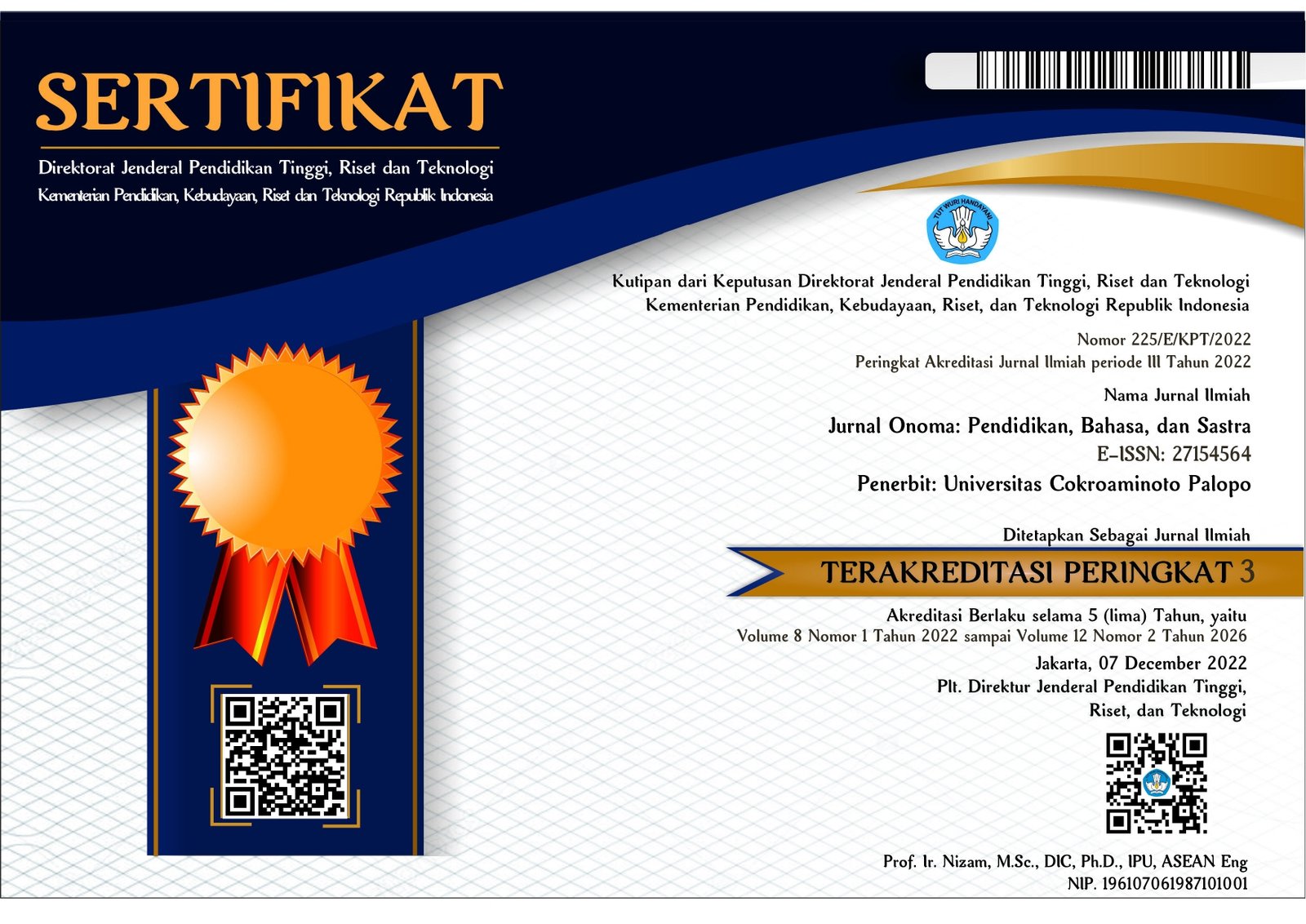Keefektifan Metode Reciprocal Teaching terhadap Keterampilan Berbicara Siswa Kelas VIII SMP Negeri 3 Palopo
https://doi.org/10.30605/onoma.v4i1.157
Keywords:
Metode reciprocal teaching, Keterampilan BerbicaraAbstract
Penelitian ini menggunakan penelitian eksperimen yang bertujuan mendeskripsikan (1) efektif tidaknya penggunaan metode reciprocal teaching pada siswa kelas VIII SMP Negeri 3 Palopo terhadap pembelajaran keterampilan berbicara. Sampel yang digunakan dalam penelitian ini yaitu sampel dibagi menjadi dua kelompok yaitu siswa kelas VIII3 berjumlah 36 orang sebagai kelas eksperimen dan siswa kelas VIII4 berjumlah 37 orang sebagai kelas kontrol. Penarikan sampel pada penelitian ini dilakukan dengan cara cluster sampling (secara acak). Hasil penelitian ini menunjukkan bahwa kelompok kelas eksperimen memeroleh skor rata-rata 80,50 dan kelompok kelas kontrol memeroleh skor rata-rata 73,64. Jadi penggunaan metode reciprocal teaching efektif digunakan pada pembelajaran keterampilan berbicara siswa kelas VIII. Metode penelitian ini merupakan salah satu metode pembelajaran yang berpengaruh positif terhadap hasil belajar siswa. Oleh karen itu, guru hendaklah menerapkan penggunaan metode reciprocal teaching dalam mengajarkan materi pelajaran karena melalui metode ini siswa termotivasi mengikuti pelajaran dan siswa merasa senang dan santai dalam belajar.
Downloads
References
Arikunto, Suharsimi. 1998. Prosedur Penelitian. Rineka Cipta. Jakarta.
Arsjad, Maidar G., dan Mukti, U.S. 2005. Pembinaan Kemampuan Berbicara Bahasa Indonesia. Erlangga. Jakarta.
Fitrianto. (2015).“Keefektifan Media Kotak Misteri Kata dalam pembelajaran berbicara Siswa Kelas VII MTsN Model Palopo”. Skripsi.Tidak Diterbitkan.UNCP.
Hermanto. (2013). Peningkatan Keterampilan Berbicara Melalui Penerapan Model Sinektik Siswa Kelas XI TKJ SMK Negeri 2 Palopo. Skripsi.Tidak Diterbitkan. UNCP.
Kolin. (2013). Peningkatan Keterampilan Berbicara Melalui Penggunaan Media Gambar Pada Anak Kelompok A TK Indriyasana Baciro Yogyakarta. Skripsi. Tidak Diterbitkan.UNCP.
Lomo. (2014). skripsi yang berjudul “ Kemampuan berbicara dengan menggunakan Teknik Talk-Power pada siswa jurusan informatika kelas XI SMK Negeri 2 Palopo”.Skripsi. Tidak Diterbitkan. UNCP.
Manohar, U. 2008 Model Reciprocal Teaching Strategis.Artikel.Tersedia pada http://www.buzzle.com. Diakses pada tanggal 23 Desember 2017.
Nunung Nurjannah Widya.(2010). Skripsi yang berjudul “ Efektivitas Penggunaan Model Reciprocal Teaching Tipe Diskusi Kelompok Dalam Upaya Peningkatan Kualitas Keterampilan Berbicara Siswa Kelas VIII SMP Negeri 1 Padaherang Ciamis “..(online).scholar.google.co.id.(diakses 10.05 Kamis 30 November 2017).
Purba. 2009. Pembelajaran Berbicara. Pusat Pengembangan dan Pemberdayaan Pendidik dan Tenaga Kependidikan Bahasa Direktorat Jendral Peningkatan Mutu Pendidik Dan Tenaga Kependidikan Departemen Pendidikan Nasional. Jakarta.
Sugiyono, 2014. Metode penelitian pendidikan ( pendekatan kuantitatif, kualitatif, dan R&D). Alfabeta, Bandung.
Saddhono, Kundharu, dan Slamet. 2012. Meningkatkan Keterampilan Berbahasa Indonesia (Teori dan Aplikasi). Karya Putra Darwati. Bandung.
Downloads
Published
How to Cite
Issue
Section
License
In submitting the manuscript to the journal, the authors certify that:
- They are authorized by their co-authors to enter into these arrangements.
- The work described has not been formally published before, except in the form of an abstract or as part of a published lecture, review, thesis, or overlay journal.
- That it is not under consideration for publication elsewhere,
- That its publication has been approved by all the author(s) and by the responsible authorities – tacitly or explicitly – of the institutes where the work has been carried out.
- They secure the right to reproduce any material that has already been published or copyrighted elsewhere.
- They agree to the following license and copyright agreement.
License and Copyright Agreement
Authors who publish with Onoma Journal: Education, Languages??, and Literature agree to the following terms:
- Authors retain copyright and grant the journal right of first publication with the work simultaneously licensed under Creative Commons Attribution License (CC BY 4.0) that allows others to share the work with an acknowledgment of the work's authorship and initial publication in this journal.
- Authors are able to enter into separate, additional contractual arrangements for the non-exclusive distribution of the journal's published version of the work (e.g., post it to an institutional repository or publish it in a book), with an acknowledgment of its initial publication in this journal.
- Authors are permitted and encouraged to post their work online (e.g., in institutional repositories or on their website) prior to and during the submission process, as it can lead to productive exchanges, as well as earlier and greater citation of published work.
















